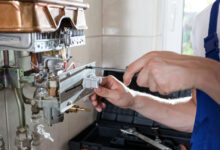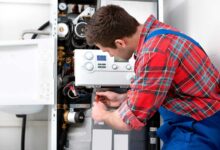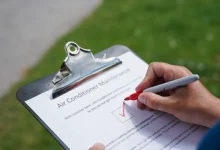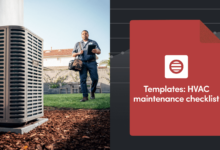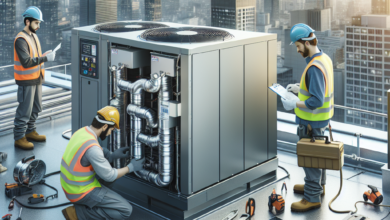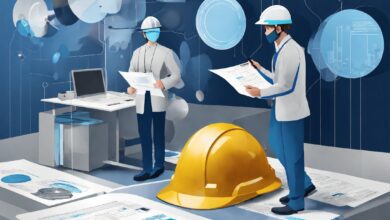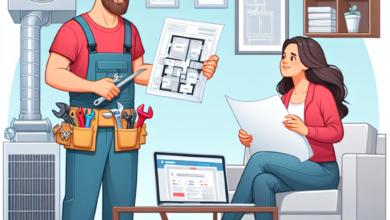Finding Reliable HVAC Maintenance Near You
Finding Reliable HVAC Maintenance Near You – When it comes to ensuring the longevity and efficiency of your HVAC system, regular maintenance is key. However, finding reliable HVAC maintenance services in your area can be a daunting task. That’s why we’ve created this comprehensive guide to help you find the best HVAC maintenance near you and understand why it is crucial for the wellbeing of your system.
In this article, we will cover everything you need to know about HVAC maintenance, from the importance of regular check-ups to the benefits it brings. We will also provide you with practical tips on how to find reputable HVAC maintenance services near your location. By the end of this guide, you’ll be equipped with the knowledge and resources to keep your HVAC system running smoothly for years to come.
Understanding the Importance of HVAC Maintenance
Regular HVAC maintenance is essential for the longevity and efficiency of your system. By scheduling regular check-ups, you can prevent costly repairs, improve indoor air quality, and increase energy efficiency. When your HVAC system is well-maintained, it operates at peak performance, ensuring that your home remains comfortable throughout the year.
Preventing Costly Repairs
Regular maintenance helps identify and address potential issues before they escalate into major breakdowns. During maintenance visits, HVAC professionals conduct thorough inspections to detect any signs of wear, leaks, or malfunctioning components. By catching these problems early on, you can save significant money on repairs that could have been avoided.
Improving Indoor Air Quality
Your HVAC system plays a crucial role in maintaining the air quality inside your home. Over time, dust, pollen, and other contaminants can accumulate in the system, leading to compromised indoor air quality. Regular maintenance includes cleaning and replacing air filters, removing dirt and debris from ductwork, and ensuring proper ventilation. This not only improves the air you breathe but also reduces the risk of allergies and respiratory issues.
Increasing Energy Efficiency
An HVAC system that is not properly maintained can become less efficient over time. Components may become dirty or worn out, causing the system to work harder to achieve the desired temperature. This increased workload leads to higher energy consumption and utility bills. However, with regular maintenance, your HVAC technician will clean and lubricate components, check refrigerant levels, and ensure proper airflow, allowing your system to operate at maximum efficiency.
Signs Your HVAC System Needs Maintenance
Recognizing the early signs of HVAC system issues can help you avoid major breakdowns and costly repairs. Pay attention to the following warning signs that indicate your system requires professional attention:
Uneven Heating or Cooling
If certain areas of your home are consistently warmer or cooler than others, it could be a sign of an underlying problem with your HVAC system. It may indicate issues with ductwork, improper airflow, or a malfunctioning thermostat. An HVAC technician can diagnose the problem and recommend appropriate solutions.
Strange Noises or Odors
Unusual noises such as grinding, squealing, or rattling coming from your HVAC system should not be ignored. These noises may indicate worn-out components, loose parts, or debris within the system. Similarly, foul odors can be a sign of mold or bacterial growth, requiring immediate attention to maintain a healthy living environment.
Increased Energy Bills
If your energy bills have been steadily rising without any significant changes in usage, it could be a sign that your HVAC system is operating inefficiently. A professional maintenance check-up can identify the root cause and restore your system’s energy efficiency, resulting in lower utility bills.
Frequent On-Off Cycling
If your HVAC system frequently turns on and off, it may be struggling to maintain the desired temperature. This could be due to a variety of issues, including thermostat problems, refrigerant leaks, or clogged filters. A professional inspection can help pinpoint the cause and restore proper functioning.
DIY HVAC Maintenance Tips
In addition to professional maintenance, there are several tasks you can perform yourself to keep your HVAC system in good shape. Here are some DIY maintenance tips:
Regularly Clean and Replace Air Filters
Dirty air filters can restrict airflow and reduce the efficiency of your HVAC system. Check your filters monthly and clean or replace them as needed. This simple step can improve indoor air quality and prevent strain on your system.
Clean the Outdoor Unit
If you have an outdoor unit, ensure it is free from debris such as leaves, grass, and dirt. Use a garden hose to gently wash away any accumulated dirt. A clean outdoor unit allows for better airflow and improves the overall efficiency of your system.
Keep Vents and Registers Clear
Ensure that vents and registers in your home are not blocked by furniture, carpets, or other objects. Blocked vents can disrupt airflow and lead to uneven heating or cooling. By keeping them clear, you allow for proper air circulation throughout your home.
Check and Adjust Thermostat Settings
Regularly check your thermostat to ensure it is functioning correctly and set at the desired temperature. Consider investing in a programmable thermostat that allows you to schedule temperature adjustments based on your daily routine. This can help optimize energy usage and save on heating and cooling costs.
Finding Reliable HVAC Maintenance Services Near You
Choosing the right HVAC maintenance service provider is crucial for the wellbeing of your system. Here are some key factors to consider when searching for reliable HVAC maintenance services near your location:
Certifications and Licensing
Ensure that the HVAC maintenance service provider you choose has the necessary certifications and licenses to perform the work. Look for certifications from reputable organizations such as NATE (North American Technician Excellence) or ACCA (Air Conditioning Contractors of America).
Experience and Expertise
Find out how long the company has been in business and inquire about the experience and expertise of their technicians. A company with a proven track record is more likely to provide reliable and efficient service.
Customer Reviews and Testimonials
Read online reviews and testimonials from previous customers to get a sense of the company’s reputation. Look for consistent positive feedback regarding their professionalism, reliability, and quality of service.
Availability and Response Time
Consider the availability and response time of the HVAC maintenance service provider. Ideally, they should be able to accommodate your schedule and respond promptly in case of emergencies.
Costs of HVAC Maintenance: What to Expect
Understanding the costs associated with HVAC maintenance is essential for budgeting purposes. While prices may vary depending on your location and the specific services required, here are some typical expenses you can expect:
Annual Maintenance Agreements
Many HVAC maintenance service providers offer annual maintenance agreements or contracts. These agreements typically include regular check-ups and discounts on repairs. The cost of these agreements can range from $150 to $500 per year, depending on the level of service and the size of your system.
One-Time Maintenance Visits
If you prefer not to commit to an annual agreement, you can opt for one-time maintenance visits. The cost of a single maintenance visit can range from $75 to $200, depending on the complexity of the system and the services provided.
Additional Repairs or Replacements
If during the maintenance visit, the technician identifies any issues that require repairs or component replacements, additional costs may apply. The cost of repairs can vary greatly depending on the nature of the problem and the parts needed.
The HVAC Maintenance Process Explained
A professional HVAC maintenance visit typically involves several steps to ensure the optimal functioning of your system. Here’s an overview of the process:
System Inspection
The HVAC technician will thoroughly inspect your system, checking for any signs of wear, leaks, or other issues. They will examine components such as the compressor, condenser, evaporator coils, and electrical connections to ensure everything is in good working order.
Cleaning and Lubrication
The technician will clean various components, including the condenser coils, evaporator coils, and blower motor. They will also lubricate moving parts to reduce friction and ensure smooth operation.
Refrigerant Check and Recharge
If your system uses refrigerant, the technician will check the refrigerant levels and recharge if necessary. Proper refrigerant levels are crucial for the efficient operation of your HVAC system.
Ductwork Inspection and Cleaning
The HVAC technician will inspect your ductwork for any leaks, blockages, or dirt accumulation. They may use specialized tools to clean the ducts and ensure proper airflow throughout your home.
Electrical System Check
The technician will inspect the electrical connections, controls, and wiring of your HVAC system. They will tighten any loose connections and ensure that all electrical components are functioning correctly.
How Often Should HVAC Maintenance Be Performed?
The frequency of HVAC maintenance visits depends on various factors, including the age of your system, its usage, and local climate conditions. As a general guideline, it is recommended to have professional maintenance performed at least once a year. However, in certainregions with extreme weather conditions or for older systems, bi-annual maintenance visits may be necessary. Consult with your HVAC technician to determine the optimal maintenance schedule for your specific system.
New Systems
If you have recently installed a brand-new HVAC system, it is still important to schedule regular maintenance visits. While new systems are generally more reliable, professional maintenance ensures that everything is functioning as intended and can help identify any manufacturing defects or installation issues early on.
Older Systems
For older HVAC systems, regular maintenance becomes even more crucial. Over time, components may wear out, efficiency may decrease, and the risk of breakdowns may increase. By scheduling more frequent maintenance visits, you can extend the lifespan of your system and address any issues promptly.
Commercial Systems
Commercial HVAC systems, particularly those serving large buildings or complexes, often require more frequent maintenance due to their higher usage. Consult with a commercial HVAC specialist to determine the optimal maintenance schedule for your specific commercial system.
Benefits of Regular HVAC Maintenance
Regular HVAC maintenance offers a multitude of benefits beyond system longevity. Here are some key advantages you can expect:
Improved Energy Efficiency
By keeping your HVAC system clean, lubricated, and in good working order, you can maximize its energy efficiency. This means your system will operate more effectively, resulting in lower energy consumption and reduced utility bills. Over time, the energy savings can offset the cost of regular maintenance visits.
Enhanced Indoor Air Quality
A well-maintained HVAC system plays a vital role in maintaining good indoor air quality. Regular maintenance, including cleaning or replacing air filters and clearing ductwork of dust and debris, helps remove harmful pollutants and allergens from the air. This can significantly improve the health and comfort of you and your family.
Extended System Lifespan
Proper maintenance can extend the lifespan of your HVAC system. By addressing minor issues before they worsen and ensuring all components are working efficiently, you can avoid premature system failure and the need for costly replacements. Investing in regular maintenance now can save you significant money in the long run.
Enhanced Comfort
A well-maintained HVAC system provides consistent and reliable heating and cooling throughout your home. By addressing any issues that may compromise comfort, such as temperature inconsistencies or poor airflow, regular maintenance ensures that your living spaces remain comfortable year-round.
DIY vs. Professional HVAC Maintenance: Which Is Right for You?
Deciding whether to perform maintenance tasks yourself or hire a professional depends on several factors. Here are some considerations to help you determine the best approach:
Skill and Knowledge
If you have experience and knowledge in HVAC systems, you may feel confident in performing some maintenance tasks yourself. However, keep in mind that professional technicians undergo extensive training and have in-depth knowledge of HVAC systems, allowing them to identify and address issues that may go unnoticed by an untrained eye.
Time Availability
Performing HVAC maintenance can be time-consuming, especially if you are unfamiliar with the process. If you have a busy schedule or lack the time to dedicate to proper maintenance, hiring a professional can save you time and ensure that the job is done thoroughly.
Equipment and Tools
Professional HVAC technicians have access to specialized tools and equipment that are necessary for comprehensive maintenance. While you may be able to perform basic tasks with household tools, certain maintenance procedures may require professional-grade equipment.
Warranty Considerations
Some HVAC manufacturers require professional maintenance to keep warranties valid. If your system is still under warranty, carefully review the terms and conditions to determine whether DIY maintenance may void your warranty. In such cases, it is advisable to hire a professional to perform the necessary maintenance.
Frequently Asked Questions About HVAC Maintenance
Here are answers to some common questions and concerns related to HVAC maintenance:
1. How long does an HVAC maintenance visit usually take?
The duration of a maintenance visit can vary depending on the complexity of the system and the services provided. On average, a thorough maintenance visit can take anywhere from one to three hours.
2. Can I skip maintenance if my HVAC system seems to be working fine?
Regular maintenance is not only for addressing existing issues but also for preventive measures. Even if your system appears to be working fine, scheduling regular maintenance visits can help identify and address potential problems before they escalate into costly repairs or system failures.
3. Can I perform maintenance on my HVAC system if I have no experience?
While some basic maintenance tasks can be performed by homeowners, it is generally recommended to leave more complex procedures to professionals. Attempting to perform maintenance without the necessary knowledge and experience can lead to accidental damage or safety hazards.
4. How can I find reputable HVAC maintenance services near me?
To find reliable HVAC maintenance services near you, start by asking for recommendations from friends, family, or neighbors. Additionally, conduct online research, read customer reviews, and check for certifications and licenses. Contact multiple providers to compare their services, pricing, and availability.
5. Can HVAC maintenance help reduce my carbon footprint?
Yes, regular HVAC maintenance can contribute to reducing your carbon footprint. A well-maintained system operates more efficiently, resulting in lower energy consumption and reduced greenhouse gas emissions. Additionally, proper maintenance ensures that refrigerants are handled and disposed of responsibly, minimizing their environmental impact.
In conclusion, HVAC maintenance is vital for the longevity, efficiency, and performance of your system. With regular check-ups, you can prevent costly repairs, improve indoor air quality, and increase energy efficiency. Whether you choose to perform some maintenance tasks yourself or hire professionals, prioritizing HVAC maintenance will undoubtedly pay off in the long run. Remember, a well-maintained HVAC system not only keeps you comfortable but also saves you money and contributes to a healthier living environment.
